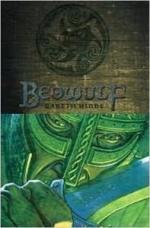{Wiglaf sits by our dead lord.}
15 With
bite of his sword-edge. Wiglaf is sitting,
Offspring
of Wihstan, up over Beowulf,
Earl
o’er another whose end-day hath reached him,
Head-watch
holdeth o’er heroes unliving,[1]
{Our lord’s death will lead to attacks from our old foes.}
For
friend and for foeman. The folk now expecteth
20 A season
of strife when the death of the folk-king
To
Frankmen and Frisians in far-lands is published.
The
war-hatred waxed warm ’gainst the Hugmen,
{Higelac’s death recalled.}
When
Higelac came with an army of vessels
Faring
to Friesland, where the Frankmen in battle
25 Humbled
him and bravely with overmight ’complished
That
the mail-clad warrior must sink in the battle,
Fell
’mid his folk-troop: no fret-gems presented
The
atheling to earlmen; aye was denied us
Merewing’s
mercy. The men of the Swedelands
30 For truce
or for truth trust I but little;
But
widely ’twas known that near Ravenswood Ongentheow
{Haethcyn’s fall referred to.}
Sundered
Haethcyn the Hrethling from life-joys,
When
for pride overweening the War-Scylfings first did
Seek
the Geatmen with savage intentions.
35 Early
did Ohthere’s age-laden father,
Old
and terrible, give blow in requital,
Killing
the sea-king, the queen-mother rescued,
The
old one his consort deprived of her gold,
Onela’s
mother and Ohthere’s also,
[99] 40 And then followed the feud-nursing foemen
till hardly,
Reaved
of their ruler, they Ravenswood entered.
Then
with vast-numbered forces he assaulted the remnant,
Weary
with wounds, woe often promised
The
livelong night to the sad-hearted war-troop:
45 Said
he at morning would kill them with edges of weapons,
Some
on the gallows for glee to the fowls.
Aid
came after to the anxious-in-spirit
At
dawn of the day, after Higelac’s bugle
And
trumpet-sound heard they, when the good one proceeded
50 And faring
followed the flower of the troopers.
[1] ‘Hige-meethum’ (2910) is glossed by H. as dat. plu. (= for the dead). S. proposes ‘hige-meethe,’ nom. sing. limiting Wiglaf; i.e. W., mood-weary, holds head-watch o’er friend and foe.—B. suggests taking the word as dat. inst. plu. of an abstract noun in -’u.’ The translation would be substantially the same as S.’s.
XLI.
THE MESSENGER’S RETROSPECT.
{The messenger continues, and refers to the feuds of Swedes and Geats.}




